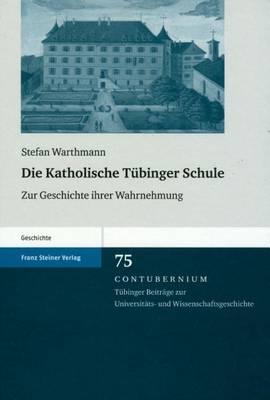Overview
"Obschon die Rede von der ""Katholischen Tubinger Schule"" in der Theologie gebrauchlich und aus der theologiegeschichtlichen Entwicklung des 19. und 20. Jahrhunderts nicht wegzudenken ist, scheint beinahe jeder etwas Anderes im Sinn zu haben, der von ihr spricht: Der eine denkt an die aufklarerisch gepragte Schule Dreys, der andere an eine romantisch-restaurative Schule um Mohler etc. Wieder andere verbinden mit ihr die Einfuhrung einer eigenen Methode oder die Grundlegung eines Traditionsbegriffs und einer eigenen Ekklesiologie. So erscheint der Terminus bei denen, die sich mit der Schule identifizieren, systematisierend als Richtungs- und Qualitatsbegriff rekonstruiert. Demgegenuber stellen Kritiker den Begriff und seine Geschichte in Frage. Mit diesem Band sorgt Stefan Warthmann fur eine begriffliche und historische Klarung, indem er den Sprachgebrauch in seiner Rezeptionsgeschichte beschreibt, auf seine Anwendungslogik hin untersucht und kritisch wurdigt."
Full Product Details
Author: Stefan Warthmann
Publisher: Franz Steiner Verlag Wiesbaden GmbH
Imprint: Franz Steiner Verlag Wiesbaden GmbH
Volume: 75
Weight: 1.220kg
ISBN: 9783515098564
ISBN 10: 3515098569
Pages: 639
Publication Date: 30 June 2011
Audience:
General/trade
,
General
Format: Hardback
Publisher's Status: Active
Availability: Awaiting stock

The supplier is currently out of stock of this item. It will be ordered for you and placed on backorder. Once it does come back in stock, we will ship it out for you.
Language: German
Reviews
This scholarly work is a dissertation done at Tubingen University and, not surprisingly, exhibits an astounding control of the primary and secondary sources. [...][Warthmann's] study of this theological direction can help isolate the directions to be pursued by other contemporary scholars. --Donald J. Dietrich, Boston College The Catholic Historical Review (01/01/0001)
The many cross references compel the meticulous reader to navigate a lot throughout the book, but also shows the well structured and strong argument towards the conclusion of the book. In any case, Warthmann's voluminous study, containing an extensive bibliography of literature on the subject and useful indexes, is indispensable for scholars studying the Catholic Tubingen School. [Warthmann] provides meticulous scholarship and bountiful information of how German theologicans of the 20th century viewed the school [...].The author synthesizes an enormous number of sources about the name of school, its founders [...], the nature of what Tubingen School means [...], its members, its life span, and numerous other aspects. This renders the book an indispensable resource for every theological library.
"""The many cross references compel the meticulous reader to navigate a lot throughout the book, but also shows the well structured and strong argument towards the conclusion of the book. In any case, Warthmann's voluminous study, containing an extensive bibliography of literature on the subject and useful indexes, is indispensable for scholars studying the Catholic Tubingen School.""""[Warthmann] provides meticulous scholarship and bountiful information of how German theologicans of the 20th century viewed the school [...].The author synthesizes an enormous number of sources about the name of school, its founders [...], the nature of what ""Tubingen School"" means [...], its members, its life span, and numerous other aspects. This renders the book an indispensable resource for every theological library."""
This scholarly work is a dissertation done at Tubingen University and, not surprisingly, exhibits an astounding control of the primary and secondary sources. [...][Warthmann's] study of this theological direction can help isolate the directions to be pursued by other contemporary scholars. --Donald J. Dietrich, Boston College The Catholic Historical Review, vol. 99, no. 2
Author Information
Stefan Warthmann, geb. 1970. 1990-1998: Studium der Katholischen Theologie und Germanistik in Tubingen. 1998-2003: wissenschaftlicher Mitarbeiter an der katholisch-theologischen Fakultat Tubingen bei Forschungsprojekten zum Werk Johann Sebastian Dreys und zu den Wirkungen und Folgen religioser Erziehung (in Kooperation von Forensik, Jugendpsychiatrie und Religionspadagogik). Seit 2003 freier Mitarbeiter bei der katholischen Rundfunkarbeit des SWR und seit 2005 Lehrer an einem Stuttgarter Gymnasium. Arbeitsschwerpunkte: Theologiegeschichte des 19. und 20. Jahrhunderts; religiose Verkundigung im Rundfunk; Sozialkompetenz in der Schule.



